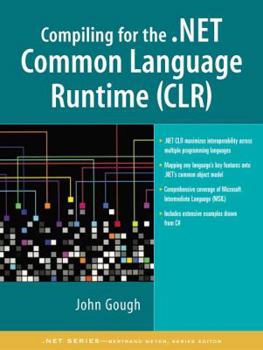Compiling for the .Net Common Language Runtime (Clr)
Select Format
Select Condition 
Book Overview
Compiling for the .NET Common Language Runtime gives software engineers critical information for creating .NET compilers or implementing .NET programming languages. Renowned compiler expert John Gough... This description may be from another edition of this product.
Format:Paperback
Language:English
ISBN:0130622966
ISBN13:9780130622969
Release Date:November 2001
Publisher:Prentice Hall
Length:416 Pages
Weight:1.80 lbs.
Dimensions:1.1" x 7.1" x 9.2"
Customer Reviews
3 ratings
Definitely the best book for IL generation
Published by Thriftbooks.com User , 16 years ago
Such a thorough discussion regarding emitting code in a .NET compiler! Though the book is a little dated now it is still highly recommended as it still covers most of the common CLR/S concerns like exception handling, overloading of methods and operators, metadata and the like. The book's publication pre-dates the Visual Studio SDK. This freely available SDK includes tools by the same author for building a managed lexer/parser. Alternatively, the latest versions of these and other related tools are available (in source form) from the author's web site at http://plas.fit.qut.edu.au/projects/LanguageProcessingTools.aspx.
Excellent coverage of IL and practical compilation for CLR
Published by Thriftbooks.com User , 23 years ago
Compiling for the .NET Common Language Runtime is a very complete book and an excellent reference. It provides a solid introduction to the CLR, type system and instruction set (IL). The discussion of code generation for the CLR is thorough.An excellent aspect of the book is that it goes beyond the more mundane aspects to discuss broader issues (for example, in mapping language semantics to the CLR). It also manages to include very practical tips such as using the visitor pattern. The book has amazing breadth and depth, yet it is marvelously concise! The writing is clear and easy to understand.Every compiler phase (from scanning to code generation) is covered, so the book is very accessible for programmers new to compilation (as I was). However I doubt that more experienced programmers will find it tedious as the chapters on scanning, parsing and semantic analysis could probably be skipped. The emphasis is obviously on code generation, and the usual language constructs (such as loops, etc.) are covered with some interesting discussion. The book also discusses other issues with compiling for the CLR-- using custom attributes, mangling names for languages that don't support method overloading, even dealing with languages with multiple inheritance (the CLR only supports single inheritance).The book generates textual IL that is compiled with ilasm, but there is a chapter on using System.Reflection.Emit. This is the only real coverage of an API, so the book avoids any tiresome material that is better left to the MSDN.
Review from CodeGuru.com
Published by Thriftbooks.com User , 23 years ago
The following review from a CodeGuru member was posted to CodeGuru.com for this book:Finally a book written by an author who knows his material and is able to express himself clearly in written form. I have reviewed many books and most of them leave me unsatisfied with the depth of information or the breadth of coverage. This book did not disappoint in either of these areas. It is excellent for those wishing to learn precisely how a language is mapped onto the CLR. Granted not everyone will have a need for such information but if you do then I would not hesitate to recommend it. That's the good news, the bad is that this book is not really needed to be a proficient C# programmer. I believe the audience for this book will be very specialized. People interested in squeezing the very last bit of performance out of C# will undoubtedly compare the IL code generated by the compiler and then modify their C# practices accordingly. Others faced with debugging in the absence of a symbolic debugger, embedded environments???, will need to code in C# and then debug in IL. For these types of situations this book will prove to be invaluable.The book does an excellent job of taking sample C# code and showing the resulting generated IL code. I can't realistically think of an example of typical code or a typical code sequence that is not covered by one of the many examples. It digs into assemblies, unmanaged code, and interaction with COM. It even goes so far as to describe how name mangling can be accomplished in languages that traditionally do not support such a feature.The assumed knowledge section indicates that the reader should be familiar with the basic concepts of programming languages, customary data structures and algorithm theory. I would also recommend that the reader have some knowledge of grammars, lexical analysis and parsing to the level of a first college course.





